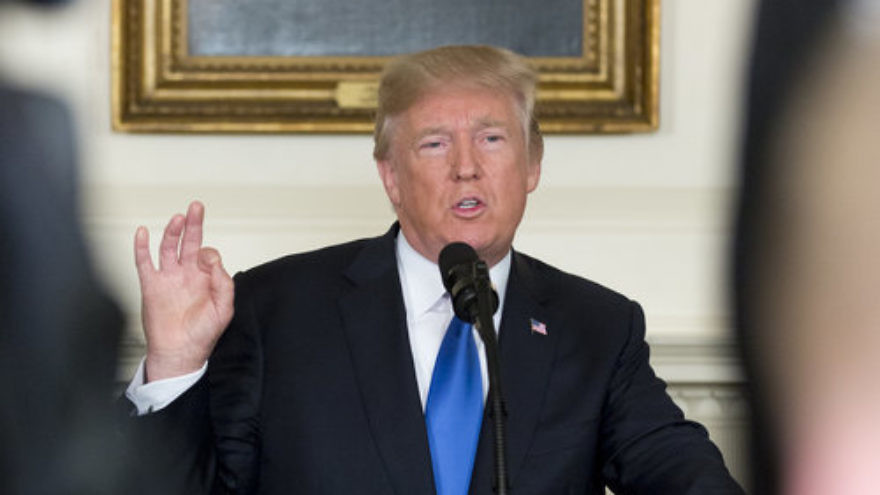With the one-year anniversary of U.S. President Donald Trump’s withdrawal from the 2015 Iran nuclear deal comes mounting tensions between Washington and Tehran, which appear to be escalating.
On Wednesday, Trump announced a series of new sanctions on the Iranian regime that seek to go beyond existing sanctions on Iran’s petroleum and financial industry.
“Today’s action targets Iran’s revenue from the export of industrial metals—10 percent of its export economy—and puts other nations on notice that allowing Iranian steel and other metals into your ports will no longer be tolerated,” Trump said in a statement about the sanctions.
He added: “It remains the policy of the United States to deny Iran all paths to both a nuclear weapon and intercontinental ballistic missiles, and to counter the totality of Iran’s malign influence in the Middle East.”
Behnam Ben Taleblu, a senior fellow at the Foundation for Defense of Democracies, told JNS that the latest sanctions by the Trump administration is the right approach to continue to pressure the Iranian regime.
“Targeting previously unsanctioned sectors of the Iranian economy is the right way to bring the maximum pressure campaign into its second year,” he said. “Iran’s non-oil exports, like industrial metals, are not an insignificant source of revenue for the regime, and [represent] one of several cash flows that should be impeded.”
In response, Iran has threatened to partially withdraw from the Iran nuclear deal and resume higher enrichment of uranium, and no longer curb its stockpile of enriched uranium.
The European Union rejected this ultimatum from Iran and reiterated its commitment to the nuclear deal.
However, in an additional sign that the United States was increasing pressure on Iran, the Trump administration also announced that it would no longer provide sanctions waivers for Iranian oil purchases. This move will likely ratchet up the pressure on the Iranian regime amid heightened tensions with America.
China, which is the world’s biggest oil importer, had begun to increase its purchases of Iranian oil in April ahead of the expected end to the sanctions’ waiver.
Saudi Arabia, the world’s top oil exporter, said it will step up requests for oil purchases it has received, especially from countries that had to stop buying Iranian crude oil due to the sanctions.
Deployment of aircraft carrier reinforces US interests in Gulf
The goal of the Trump administration appears to be geared towards exerting maximum pressure on Iran in order to not only curb its ambitions regarding nuclear weapons, ballistic missiles and regional aggression, but also to potentially topple the regime, which has taken on an increasingly belligerent posture.
“Recent Iranian responses to escalating sanctions pressure is already a sign that Tehran simply cannot afford to wait out the Trump administration,” said Ben Taleblu.
Indeed, a recent intelligence tip from Israel—saying that Iran was preparing to attack U.S. or allied forces and/or interests in Iraq and Syria—caused the United States to deploy the aircraft carrier USS Abraham Lincoln to the Persian Gulf, potentially leading a military confrontation between the two countries.
“Any attack on United States interests or on those of our allies will be met with unrelenting force,” National Security Advisor John Bolton said on May 5. “The United States is not seeking war with the Iranian regime, but we are fully prepared to respond to any attack.”
Ben Taleblu said the deployment of the aircraft carrier to the region further reinforces U.S. interests there, while sending a clear message to Iran.
“The military repositioning of the U.S. in the Persian Gulf underscores America’s existing posture and goals in the region,” he said. “Indeed, the USS Abraham Lincoln, which is the carrier leading the new strike group, was previously sent into the Persian Gulf by President [Barack] Obama in January 2012 as a signal of American resolve.”


























